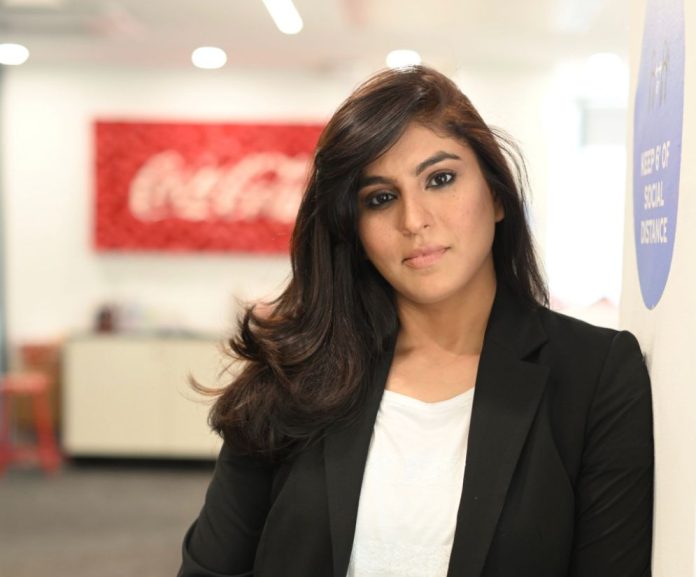Synergyzer: Tell us about your role centered on Communications, PR, media, etc.
Aisha Sarwari: At Coca-cola, we call it the PACS team, which stands for Public Affairs, Communications, and Sustainability. All of these areas have to do with Public Relations with corporate communications and sustainability – or Environment, Social, and Governance (ESG) at the core. I am directing Pakistan and Afghanistan region and I report to Eurasia and the Middle East. Essentially, we are responsible for protecting the reputation of the company.
Synergyzer: What drove you towards it? Were you innately a people’s person, or did you grow into it with time and experience?
Aisha Sarwari: I would call it luck. I graduated from the United States, and I worked in the US in CNN and National Public Radio (NPR). I trained to be a media, television, and internet content professional, but when I came to Pakistan, I didn’t find opportunities in journalism. So I ended up working with a startup. Because I had a knack for communication so I eventually specialized in it. With US Identified Adam Smith Development Sector. When I went for the government sector, I aimed for communications, and obviously, then the private sector took its course. I believe I chased pay cheques, and luck brought me here.
Synergyzer: Coca-Cola has historically been a very receptive organization towards global changes, be it a focus on sustainability, EDI, AI, or Technology. How do you think it has evolved in Pakistan?
Aisha Sarwari: The Coca-Cola Company is working with the OpenAI x Bain alliance to integrate ChatGPT and DALL·E into its content creation and brand experiences. “We see opportunities to enhance our marketing through cutting-edge AI, along with exploring ways to improve our business operations and capabilities,” said James Quincey, Chairman and CEO of The Coca-Cola Company, in the Bain announcement. So yes, Coca-cola has been ahead of its game in adopting technology. This is because we are majorly influenced by global standards, whether it is Emission Estimation Technique (EET) in recycling or sustainability. Having said that, I do feel that Pakistan and Afghanistan teams are superbly creative as we try to really push the envelope on big projects.
So rather than going to a beach or a park for a cleaning drive with a recycled bag (of course, these are all important actions to contribute to the bigger change). What differentiates us is in the larger projects, like in the past, we have used 10000 tonnes of plastic that was recycled to use plastic waste and re-carpet roads to pave a kilometer-long patch of Ataturk Avenue in Islamabad. This was collaboratively done in partnership with the technology hub Teamup and the Capital Development Authority. Then we use good practice to invite other corporate giants to venture into similar plans and scale it up.
Synergyzer: Speaking of AI, it is new now. How has it integrated with what’s trending in PR & Communications, Brands, and Advertising?
Aisha Sarwari: AI has definitely helped with building good practices for our brands. For instance, we have initiated a clean-up of the Liyari River, so there is a lot of appetites locally as well to pool in research, including product launches, etc. So we are pretty ahead of the curve as well. So in the tech circuit, we have been one of the first and early adopters of AI. Also, the thing with technology is that it is an ocean current. It will wash away everything in a certain direction if you don’t adopt it eventually.
You can sit and watch it pass you by, or you could ride with the wave and lean into the insecurity and scariness of something as large as the AI. And I can assure you that there has been a large chunk of interesting content emerging out of AI. But we have yet to explore what it will do with human beings, their empathy, and the soft skills, to make decisions for us. There is a lot of apprehension surrounding AI, but we have taken the bold step of being part of the current. Because we want to stay on the right side of all the technological advances in the world.
Synergyzer: Pakistan has been slow to adopt changes while global companies, such as Coca-Cola, have fared relatively well. Can you tell us the role research and analytics play in your branding and communications and how it helps in predicting buying behaviors, product development, communication designing, etc., with all these technological advancements of the new age?
Aisha Sarwari: We are a company that is heavily dependent on the evidence before we make decisions regarding strategies or investments, or funding projects. We see how it impacts communities, the planet, and, of course, business operations. Coca-cola is a 100-year-old company, so we never look at how big we can become in the next 5-10 years. We ensure our actions will be remembered by the coming generations. So the mindset is quite futuristic, and it is important when you have to utilize AI-powered tools, such as Power BI, which gives us a bulk of data about how our products are viewed and how it can impact the supply chain.
Synergyzer: How does artificial intelligence shape the future trends in the beverages industry, and how will it affect the brands and their narratives?
Aisha Sarwari: The very obvious future trend is going to be our very close coordination behavior with the psychographics of the consumers. Why do they want to buy what they want to buy? Why don’t they buy what they don’t buy? The idea essentially is to speak to their needs. As human beings, we have fears and dreams. Similarly, we must understand their needs. Is the consumer conscious of what they want so they can be more environmentally cognizant? And we must address that need immediately. AI has an immensely positive impact that way because it shifts the power back to the consumers and other stakeholders. Consumers are not just faceless beings with needs that must be fulfilled by organizations. They possess deep inspiration on why they aim to achieve what they want to. This way, the data can really inform companies to shift before it becomes a business need.
Synergyzer: The adoption of AI is still in its infancy, not only in Pakistan but globally as well. In your opinion, what are some of the challenges companies in Pakistan are going to face to use data and AI to their advantage?
Aisha Sarwari: The challenges are going to be pretty much the same when any technology takes over. The same thing happened with the radio, television, and the internet. And now, with AI, with this massive amalgamation of all these mediums into one. It will be uncomfortable. There is going to be cynicism. There will be a lot of concentrated power. It will then dissolve into numbers until it becomes more democratic. Like every change, it will need time to adjust to.
An important element to look out for is that whatever AI brings forth in terms of scale and numbers, the impact will also be large and so the stakes might also be high. In the midst of all of this, our ethics must guide our business practices. We must eventually learn to bow down to the rules that govern AI, whether it is privacy, consent, or effective use of data. There are very strong guidelines for cyber ethics. Responsible companies such as Coca-cola are extremely diligent about its use. That is why the partnership makes sense because we will be the first to learn.
Synergyzer: In a rapidly changing world, where innovation is happening almost daily, how is it changing the decision-making process?
Aisha Sarwari: In today’s day and age, I believe nobody even questions making decisions based on instinct, fear, or motivation. Everything must be backed and supported by numbers, figures, data, evidence, and sentimental analysis. Of-the-cuff decisions aren’t relevant anymore.
Synergyzer: Media and Communications are rapidly shifting towards digital and social mediums. We have witnessed the success of CokeStudio around the world because of its scalability. Coca-Cola is a brand that continuously innovates its communications tactics. What are the future trends in the beverages industry that may disrupt the brands’ communications, outreach, and surrounding campaign-ability?
Aisha Sarwari: This reminds me of a book I read, Weapons of Math Destruction, by Cathy O’Neil. It cautions against over-reliance on data. There is the algorithm, which is majorly based on who is empowering it. And this drives the point home that it is extremely important to remain locally relevant. CokeStudio Pakistan is Cocacola’s most important asset. We have managed to export extraordinary talent. We have also been honored by the foreign office for the best cultural export of Pakistan. Yes, data is important, but so is culture, ancestral history, legacy – and the musical technology that has been passed on to us across generations from our provinces, along with the instruments they made – and ensuring that we carry that on.
Data plays a very important role here because of what we feed into that data bank. And Coke Studio’s musical content has successfully put Pakistan on the digital map. So, it is really a two-way process, where we put across local content globally, and we let the global content affect us locally as well. For the first time in Pakistan, I believe, CokeStudio has really won the cultural war. The credit goes to our wonderful artists who have uncompromised on diluting something quintessentially Pakistani.
Synergyzer: A lot of AI-based writing tools have emerged in recent times, and people are debating whether tools like ChatGPT have made (or going to make) writers and communications professionals quite challenging or may eat it in the future. As a team leader, do you think there are roles that cannot be replaced by technology or innovation?
Aisha Sarwari: I think AI will help us do much more good work. Human capabilities are pretty limited. As leaders, with the pressure of delivering high-quality work at all times, we may experience burnout. It has been especially true during COVID-19. We have all gotten tired. The pandemic hasn’t left anyone richer, more capable, or better connected to society. It has isolated us, depleted us; it has drained us – we lost many people around us, family and friends. So if anything that allows us to make our work better, more easily, and much faster, that will be a more welcome change. This makes a lot more important elements irreplaceable – business ethics, kindness, generosity, local culture, and wisdom. For everything else, if we have AI, I think we should rely on it.


